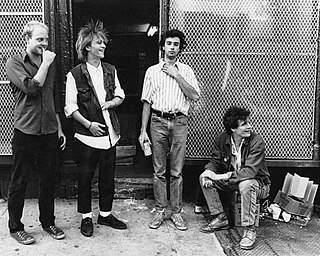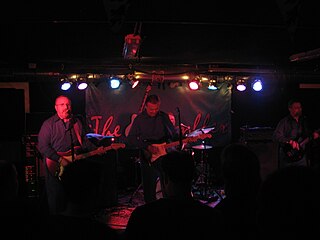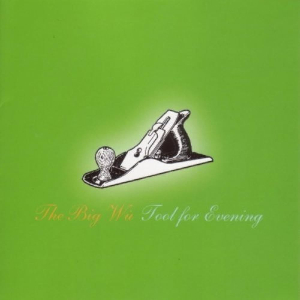History
The Big Wu was founded in 1992 at St. Olaf College by students Chris Castino (guitar, vocals), Terry VanDeWalker (drums, vocals), and Jason Fladager (guitar, vocals). Andrew Eklund (bass), Nathan Eklund (Keyboards; formerly with Kubla Khan, Virginia Circle, and The Stretch), and drummer Chip House made up the rest of the regular lineup. Julie Crumrine (vocals) and Julie Niksitch (vocals) made frequent appearances.
The band played their first gig on February 14, 1992 in the Lion's Pause in the basement of the old Ytterboe Hall at St. Olaf College in Northfield, Minnesota, playing an assortment of rock music cover material. Castino was the bassist for this and several following performances until he switched to guitar in the fall of 1992. Andrew Eklund was inserted as the band's new bassist. The Big Wu continued to play every three weeks or so in town above the Reub-n-Stein, the most popular local bar at the time. Big Wu shows quickly became one of the biggest events on campus, and posters widely covered the cafeteria walls at both Carleton and St. Olaf, and throughout Northfield. The band left Northfield in 1995 and established a homebase in the Twin Cities.
Before writing their own material, The Big Wu incorporated many songs from The Grateful Dead repertoire into their live performances, as well as songs from other classic rock artists like The Allman Brothers, Bob Dylan, and Phish. After the death of Jerry Garcia in August of 1995, The Big Wu played a well-attended tribute performance for Garcia and gained the respect of the Twin Cities Deadhead community. On September 11, 1995, the Big Wu headlined at the Terminal Bar on Hennepin Avenue in Northeast Minneapolis for the first time. This gig started a run of shows that lasted from the end of 1995 into most of 1996. A little over a month later on October 28, 1995, they debuted their first original song "Silcanturnitova". Over the next four years a barrage of new songs was written including "Bloodhound", "Red Sky", "Precious Hands", "Kangaroo", and "Puerto Rico." It was also at the Terminal Bar where the lineup was solidified, with Chip House, Andrew Eklund, and Nathan Eklund all leaving the band to pursue professional careers. At the time the Big Wu was looking for a keyboardist and bass guitar player. Andy Miller, also a St. Olaf College graduate, got the job playing bass, and several months later, Al Oikari (Paul Metsa, Cats Under the Stars) sat in on keys and eventually became a member of the band.
At the end of 1996, the Big Wu got the job as the house band at the legendary Cabooze Bar in Minneapolis. Wednesday night became a regular night out for what became known as the "Wu Family", a dedicated fan base that served as the test market for new songs as the band reshaped their shows around original music and playful lyrics.
On September 12, 1997, Tracking Buffalo Through the Bathtub , the Big Wu's debut CD was released. Though a CD release party was held at the Cabooze, the CD itself did not arrive at the show due to shipping problems, and the album wasn't available for purchase until the following week. Similar gaffes and logistical ironies would plague the band over the next several years, prompting a gentle self-mockery that became a staple of the band's onstage humor.
On July 17, 1998, the Big Wu hosted the first ever Big Wu Family Reunion at Latch Lake Studios in Eagan, Minnesota – the local studio where Tracking Buffalo Through the Bathtub had been recorded the year before. The next year, the Family Reunion was held at Harmony Park Music Garden in Geneva, Minnesota, and the event would be held at either Harmony Park or the Jamboree Campground in Black River Falls, Wisconsin thereafter. The Family Reunion drew thousands of concert-goers each year during the early 2000s, and the festival served to introduce the Midwest to a number of jam bands that would later find a national audience.
Short tours throughout the Midwest and periodic gigs in Colorado led the Big Wu to hit the road full-time in 1999, and they would average 150–200 shows a year for the next several years.
On October 17, 2000, the band released their second album Folktales on a small jam band oriented record label out of New York called Phoenix Rising Records. The album enjoyed a good ride, but was quickly forced into the abyss when Phoenix filed for bankruptcy a little over a year later. For the following two years, the Big Wu were unable to sell CDs to the public because the assets of the record label (including Tracking Buffalo Through the Bathtub and Folktales) were tied up in bankruptcy court.
While the band was in record label limbo, they took to recording a third CD, Spring Reverb . The album was produced by Bill Cutler, a veteran producer who had worked with the likes of the Grateful Dead. With Cutler at the wheel, the Big Wu created what is generally their most well-regarded album, recording at Pachyderm Studio in Cannon Falls, Minnesota, and at Oar Fin Records in Minneapolis. At the end of the summer in 2002, the Big Wu's contract with Phoenix was nullified, and they were able to buy their assets back, making the release of the newly finished album possible. The Big Wu played a CD release party for Spring Reverb at the Historic State Theatre on November 2, 2002.
On June 21, 2002, The Big Wu's rising fame gave them the opportunity to open the first ever Bonnaroo Music Festival. They were they inaugural act for the first year of the festival. "Rhode Island Red" from that performance was selected to represent the band on the release Live from Bonnaroo - Volume 2.
During the 2002 Harvest Festival at Harmony Park Music Garden in Geneva Minnesota, the Big Wu played two long nights of music. The first ended up being guitarist Jason Fladager's last show. There was no announcement from stage, although the band knew that Fladager had no intent on returning for the second night. The second night of the festival, the Big Wu played a long set without one of their founding guitarists. A few days later the band announced that Fladager had left the band to be closer to his family. The guitarist's absence prompted the band to reinvent itself as a four-piece. Jason Fladager would go on to start his own band called God Johnson. [1]
The Big Wu released Tool for Evening in 2004, their first record as a four-piece. A live album followed in 2006. Following the band's 2006 fall–winter tour, which included a run of shows in Japan, the band took some time off the road, playing only a handful of shows in 2007 in their home state of Minnesota.
In 2009 The Big Wu announced that original member Jason Fladager was to re-join the group and they have since played a number of shows as the original five piece including a recent show at Festival Bella Madre. But the reunion with Fladager was short lived and in 2010 the band made the official move to replace him with Northfield, MN native Mark Joseph as the 2nd guitar player. The Big Family Reunion Festivals were held in 2015 and 2016 at Camp Maiden Rock West in Morristown, Minnesota. And in 2018 the band (with Joseph well established as a member) recorded their 5th studio release We Are Young, We Are Old.
In 2022 The Big Wu celebrated 30 years with an historic show at Saint Paul's Fitzgerald Theater featuring Fladager, jazz legend Dean Magraw, and Hall of Fame bluegrass musician Peter Rowan, as well a cameo from producer Bill Cutler. The band continues to perform their annual First Avenue mainroom winter concert series, always held in December.
















